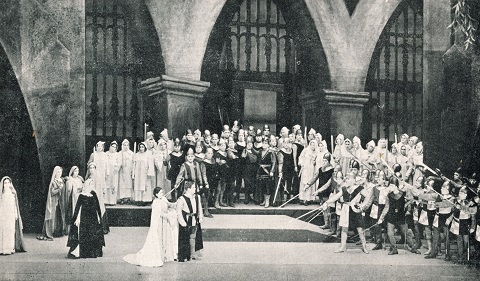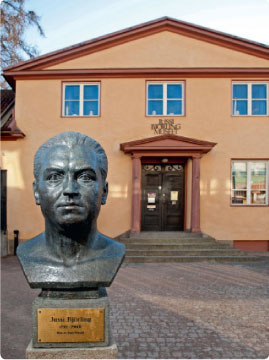Jussi of the Month December 2017
When WW2 was over Jussi could resume his activities in the US after four years spent primarily in Sweden. And it was no short periods he spent “over there” during the late 1940s:
7 October 1945 – 15 May 1946
5 October 1946 – 5 April 1947
7 December 1947 – 15 May 1948
9 October 1948 – 11 April 1949
23 August 1949 – 15 December 1949
13 February 1950 – 12 May 1950
During those years Jussi was able to celebrate Christmas in Sweden only once, 1949, but after a few weeks he was back in the States again. The autumn 1947 differed somewhat from the pattern, since he then didn’t cross the Atlantic until December. But he made however some guest appearances at the Royal Opera in Stockholm, the last one on 1 December in Tosca. In the pit was, as so often, Nils Grevillius and among the colleagues on the stage were Ruth Moberg in the title role and Einar Larson as Scarpia. In the morning papers that day was a short notice proclaiming: “Last guest appearance of Jussi BJörling. SOLD OUT!” Sold out it had been also two days earlier when he appeared in Bohème together with Helga Görlin, Henriette Guermant and Hugo Hasslo. In Dagens Nyheter the day after the farewell performance was a notice with the header “Jussi took a brilliant farewell” and it was also reported that he was paid tribute to the whole evening. On the photo attached to the notice was Jussi seen together with Einar Larson.
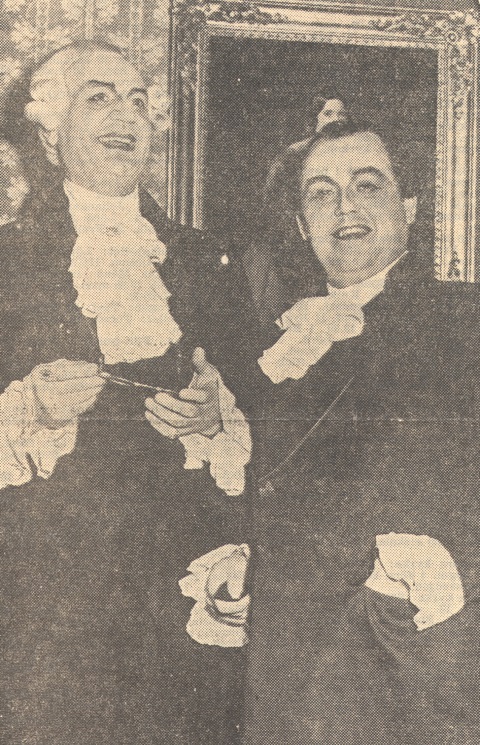
Einar Larson and Jussi after the performance on 1 December 1947
And then he took off for the big country way west. The first halt was Cincinnati in Ohio, where he appeared at Netherland Plaza Hotel, Mirror Hall on 7 December. It was his first visit there and it was sold out. The organizer even announced in the local papers that no tickets would be sold at the entrance and at the same time pointed out that the concert would begin as early as 3 p.m. Jussi arrived at the concert almost directly from Stockholm but was in excellent form. The announced programme contained the following numbers:
Mozart: Dalla sua pace from Don Giovanni
Wolf: Verborgenheit
Liszt: Es muss ein Wunderbares sein
Strauss: Zueignung
Meyerbeer: O Paradiso from L’africaine
Interval
Massenet: Ah! Fuyez, douce image from Manon
Peterson-Berger: 3 songs
Giordano: Come un bel di di Maggio from Andrea Chenier
Not a very comprehensive programme, in other words, but as was his wont Jussi inserted a number of encores between the announced pieces, this time no fewer than seven: La donna è mobile, Nessun dorma, Mattinata, Schubert’s Ständchen, Sibelius’s Svarta rosor and Säf, säf, susa and Stephen Foster’s I dream of Jeannie, " a lyric bit he sang in faultless English” as John P Rhodes of Cincinnati Enquirer put it in his review. Both he and his colleague Howard W Hess of Cincinnati Times-Star were greatly impressed by Jussi’s linguistic capacity. Besides English he sang in another five languages: Italian, French, German, Swedish and Finnish! Finnish wasn’t true, but the two gentlemen supposed that the Finn Sibelius’s songs must have been sung in that language. Rhodes obviously didn’t know the P-B songs but thought that "the most interesting of them melodically being one listed as Bland skogens hoga furustammer". Hess stated that “…the concert was of the very best. Björling was in top form, his program was excellently built and was all carried through with consummate artistry. Full-bodied tone of appealing timbre without any seeming limit as to range, breath control or musical understanding made this recital a perfect musical experience --- Some of the finest singing was heard in the encores, notably the aria Nessuno dormo (Sic!)” But he also had objections: “Schauwecker [the accompanist] was too noisy and hard-sounding for me and he did not possess a smooth legato. He seemed to suit Björling, so why should anyone quibble?” Rhodes finished his article “It was a red letter day in Cincinnati’s musical history – a date that would have been even more memorable if the recital had been given in an auditorium large enough and acoustically satisfactory for full exploitation of Björling’s enormous voice.” Eleanor Bell expressed in Cincinnati Star her appreciation of of Jussi’s singing, which “gave a high degree of saticfaction from almost any angle. His voice was free of affectation, it was fluent, melodious and disciplined.”
Two days later, on 9 December, it was time for the next concert. The journey went west-southwest from Cincinnati to St Louis in the state of Missouri. The town is situated near the place where the tributary river Missouri joins Mississippi in the eastern part of the state. A lot of musical personalities have grown up in St Louis: Josephine Baker, Chuck Berry, Miles Davis, Scott Joplin, Charlie Parker, Ike and Tina Turner, and among other celebs can be mentioned poet and Nobel Prize Winner T S Eliot, actress Betty Grable, General and later on President Ulysses S Grant, aviation pioneer Charles Lindbergh and professional boxer Archie Moore. Also author Tennessee Williams and actress Shelley Winters had their roots in St Louis.
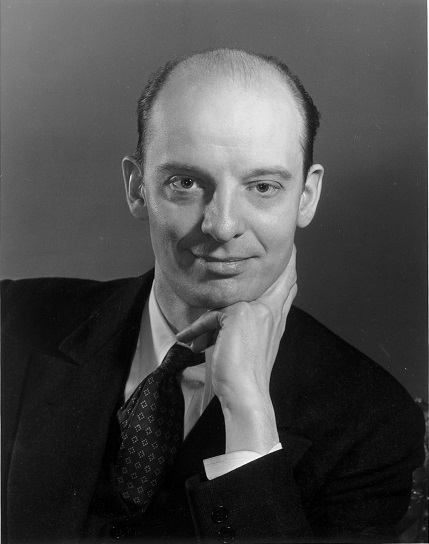
Frederick Schauwecker
The concert took place in Kiel Auditorium, accompanist, as on the whole tour, was Frederick Schauwecker, but the programme was practically completely different from that in Cincinnati: Beethoven’s Adelaide, Schubert’s Wandreres Nachtlied and Die böste Farbe, Strauss’s Morgen and Ständchen, Addio alla madre from Cavalleria rusticana, The flower song, Che gelida manina and Verdi’s Ingemisco. “For an encore he sang a Donna è mobile that left all of the other tenors in the house a little short of breath. This was inflected with such extraordinary skill that it seemed quite new”, wrote Reed Hynds in St Louis Star-Times. It was the first time for Jussi in St Louis as well and the interest from the public was as overwhelming as in Cincinnati. “The singer was welcomed by an audience which filled even the orchestra pit and which was tremendously enthusiastic throughout the evening”. Adelaide as a song wasn’t exactly Hynds’s cup of tea and three Italian songs didn’t please him either, but he enjoyed the opera arias wholeheartedly. He also reported that Schauwecker also had a portion of his own where he played Brahms, Grieg, Chopin and Lecuona.
Next halt, on 11 December, was Manhattan, a town with today about 50,000 inhabitants, in northeast Kansas, a bit further westward. For us household names with roots in Manhattan are not numerous, except Earl Woods, baseball player who made a military career during the Vietnam War and ended up as lieutenant colonel, but he is best known for teaching his son Tiger Woods to play golf. The concert was held in Kansas State College Auditorium and the programme book was uncommonly full with summaries of all the sung texts. Unfortunately it hasn’t been possible to find any reviews of the concert.
On 13 December we celebrate Lucia in Sweden. The tradition has a long history, at least to the Middle Ages, but the way we celebrate today is a 20th century phenomenon and it became really popular when a Stockholm morning paper announced the first Lucia competition in 1927. By and by it also reached the US, in particular the Swedish settlements up north. By 1947 it had advanced as far as the crowning of the first Lucia in “The Twin Cities” Minneapolis-St Paul. For this reason a "Special Lucia Day Concert” was arranged in the enormous Northrop Memorial Auditorium before 6,000 listeners. The main attraction was Jussi Björling but the crowning of Lucia was also a big event. In the lavish programme booklet was a long essay, “The History of Lucia Day”, written by Burton Wohl from Stockholm. The name of Lucia was Irene Johnson and she and her maids – here named princesses – were depicted in the booklet, as was Jussi and his Anna-Lisa. She had the great responsibility to crown Lucia. She was of course well qualified for the task, since she had herself been crowned Stockholm’s Lucia in 1933. She sang Sancta Lucia and then crowned Irene before the cheering audience.
Four concerts in eight days was an awesome start of the American stay, but now he had almost two weeks' break before the next challenge: six performances at the Metropolitan Opera in two and a half weeks. After that he had to pack up his suitcase for further touring.
On Christmas Day he had his first appearance for the season at the MET as the Duke in Rigoletto. The fair Lily Pons was Gilda and the title role was taken by Leonard Warren. This was towards the end of Edward Johnson’s sojourn as head of the MET and time and again criticism had been severe concerning slovenly and under-rehearsed performances, miserable direction and – not least – insensitive casting. Now there were other strains. Howard Taubman in New York Times opened his review “The Metropolitan Opera evidently found under its Christmas Tree what it badly needed – a performance worthy of its reputation. Last night’s Rigoletto was done the way all – well, nearly all – productions at the Metropolitan should be done. It had singers who could sing and who knew what they were singing about …” Jussi "was in top form. His tenor has the crisp, resounding brilliance that is perfectly in character for this role, and he used it stunningly last night. When Mr Björling is in the vein, there are few lyric tenors at large to match him.”
Listen to Ella mi fu rapita from Rigoletto from 1956 (Naxos 8.101 101)
And Taubman was not alone in his admiration. An unsigned notice in Musical America said “Mr Björling’s voice has never sounded fresher.” And New York World – Telegram did its share “Mr Björling’s delivery of the Duke’s music was a reminder that when in the mood, this lad flaunts one of the best high registers in the Met’s tenor wing. The acting was also of top calibre last night.” Miles Kastendieck in New York Journal agreed: “The return of Björling heightened interest. Few tenors can match him at his best; perhaps none can rival him for a brilliant top. He sang at his best for a good portion of the evening, winning an ovation for hid third act aria.”
Virgin Thomson in New York Herald Tribune focused, like Taubman, on the Christmas season: “Rigoletto at the Metropolitan Opera House last night turned out to be a Christmas gift. Not that the Met does not owe its faithful public a good show after so many inferior offerings as have been presented this season. All the same, that one should have turned up on Christmas, of all nights, is a bit of luck for all concerned, including the management, which may well have been as surprised as any of us out front that no unhappy accident of any kind marred the occasion.” He then commended both conductor and soloists, where he first of all hailed Leonard Warren as “the finest bit of characterization your reviewer has yet witnessed from this artist.” He continued “Jussi Bjoerling, the tenor, came on in excellent voice, full of brilliance and bravura.”
His colleague in New York Sun, the tough Irving Kolodin, was all smiles: “ Last night's Rigoletto at the Metropolitan was a rousing performance of Verdi's melodious tragedy for three shining reasons: Jussi Bjoerling returned in brilliant voice, Leonard Warren sang the best Rigoletto of his career and Lily Pons affirmed her singular position among current sopranos.” Further on in the review he mentioned “The reports from Europe on the malady that has delayed Bjoerling's reappearance - sciatica is the general diagnosis - were fortunately not reflected in this performance. The pure vibrance of his voice is unimpaired, as he proved with every phrase he sang. He has, moreover, struck a balance between virtuosity and musicianship, so that he could thrust home a high D flat in his second act duet with Gilda without also striking a posture. Parmi veder was magnificently sung, as was his portion of the quartet.”
Il trovatore on 27 December obviously didn’t attract the New York papers but Musical America had a short notice commenting on Jussi as the newcomer of the ensemble. The others were as previously Stella Roman as Leonora, Margaret Harshaw as Azucena, Leonard Warren as Count Luna and Giacomo Vaghi as Ferrando. Emil Cooper was the conductor.
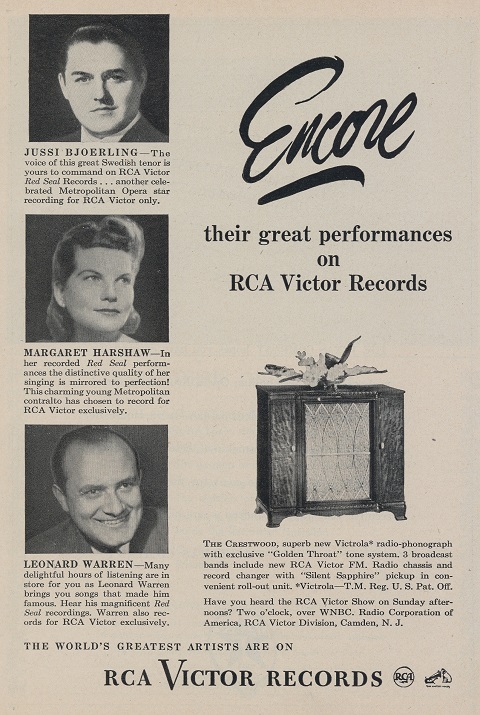
Advertising 1947
“Once again the Swedish tenor was in outstanding form and sang with vitality and sense of style.” The performance was broadcast and has afterwards been issued on CD. In Paul Jackson’s “Saturday Afternoons at the Old Met” (1992) there is a strongly negative review, indicating that Jackson only had access to a truncated version. The version issued by West Hill Radio Archives almost ten years ago have cuts but only such that were common at the time. However Jackson writes, after venting his spleen upon most things: “Amidst all the wreckage, Warren floats the bel canto line of Il balen with assurance. But the saving grace of the afternoon is Björling’s troubadour, captured in its entirety. Most striking is the lyrical flavour of his reading in what is usually a rather strenuous vocal workout. Even Björling in his only other Trovatore broadcast (1941) marshalled all his vocal resources for a portrayal heavy on brilliance. Not so this afternoon. Time after time he employs head resonance where we expect the more baritonal timbre and firmest breath support. His serenade is sung as sweetly as a chanson (a gratifying change from the bawling one usually hears). Moreover, he offers a number of delicate vocal effects never heard in the role (and seldom heard from Björling in any role, for that matter). Several times he essays a messa di voce, first at the close of his angelic Mal reggendo (the attempt turns virtually into falsetto) and then, more successfully, on the penultimate note of Ah si, ben mio, again not perfect but quite lovely. The recitative leading into the aria may not have the tensile grandeur of Martinelli’s reading, but its color and lyrical extension are equally telling. Cooper takes the aria at snail’s pace, and so cloudy is the accompaniment figuration that Björling can hardly find his way; he consistently moves slightly ahead – for all that, it is beautifully done. A nonstentorian Di quella pira may be refreshing, but Björling’s temperature (and ours) remains at normal in this heated moment (again, the high Cs are more head tones than brilliant climaxes). More appropriate is the tenor’s dreamlike close to Riposa o madre in the final act.”
Listen to Deserto sulla terra from Il trovatore from 1950 (Naxos 8.101 101)
Click on the image to get it larger
The third performance was on New Year’s Eve as Turiddu in Mascagni’s Cavalleria rusticana, which was coupled with the old inseparable friend Pagliacci. There the tenor role was sung by Frederick Jagel. Giuseppe Antonicelli conducted both operas and Jussi’s Santuzza was Regina Resnik. Irving Kolodin was there as well and was particularly curious about Jussi’s first appearance as Turiddu at the Met. “Somewhat paradoxically, the performance was more creditable for the dramatic, than for the vocal force of his performance. When the music was lyrical, Björling sang it with care and suavity, with the fine resonance he commands so well, but it too often asks a trumpeting fullness which robs his tones of their best qualities.”
Jussi sang Turiddu at the Met on a few other occasions, notably three performances in November/December 1959, less than a year before he passed away. He had then been absent from the Met for two years. About the first, in 16 November, Richard Lewis wrote in Musical America: “No victorious Caesar returning to Rome could have produced a greater ovation than that which greeted Jussi Bjoerling when he made his entrance as Turiddu in Cavalleria Rusticana. The opera came to a standstill, and the audience gave forth an explosive bravo that even now continues to linger as a reminder of a performance which was transcendent and electrifying.”
A touching and gratifying acknowledgement of Jussi’s greatness, conveyed twelve years after the events that have been described in this edition of “Jussi of the Month”
Listen to Addio alla madre from Cavalleria rusticana from 1950 (Naxos 8.101 101)
Göran Forsling


